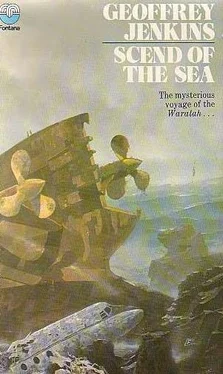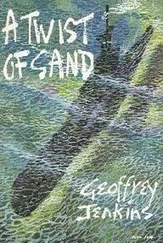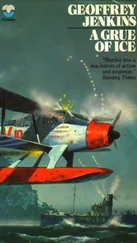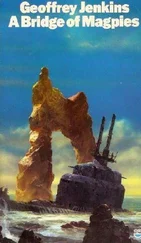Geoffrey Jenkins - Scend of the Sea
Здесь есть возможность читать онлайн «Geoffrey Jenkins - Scend of the Sea» весь текст электронной книги совершенно бесплатно (целиком полную версию без сокращений). В некоторых случаях можно слушать аудио, скачать через торрент в формате fb2 и присутствует краткое содержание. Жанр: Морские приключения, на английском языке. Описание произведения, (предисловие) а так же отзывы посетителей доступны на портале библиотеки ЛибКат.
- Название:Scend of the Sea
- Автор:
- Жанр:
- Год:неизвестен
- ISBN:нет данных
- Рейтинг книги:5 / 5. Голосов: 1
-
Избранное:Добавить в избранное
- Отзывы:
-
Ваша оценка:
- 100
- 1
- 2
- 3
- 4
- 5
Scend of the Sea: краткое содержание, описание и аннотация
Предлагаем к чтению аннотацию, описание, краткое содержание или предисловие (зависит от того, что написал сам автор книги «Scend of the Sea»). Если вы не нашли необходимую информацию о книге — напишите в комментариях, мы постараемся отыскать её.
Scend of the Sea — читать онлайн бесплатно полную книгу (весь текст) целиком
Ниже представлен текст книги, разбитый по страницам. Система сохранения места последней прочитанной страницы, позволяет с удобством читать онлайн бесплатно книгу «Scend of the Sea», без необходимости каждый раз заново искать на чём Вы остановились. Поставьте закладку, и сможете в любой момент перейти на страницу, на которой закончили чтение.
Интервал:
Закладка:
Geoffrey Jenkins
Scend of the Sea
PROLOGUE
Last entries from log of missing yacht Touleier: July 28th, 1971
5p.m. Ship out of control
Latitude, unknown; longitude, unknown. Course, unknown. Visibility, nil.
Position (dead reckoning)-400/500 miles north-north-east Waratah hulk.
Furious gale unabated (6th day). 65 m.p.h. estimated, anemometer blown away. Beaufort scale, southwest/10. Run of sea — mountainous southwest, high and short, waves approx. 35/40 ft.
Barometer at lowest, 985 millibars.
530 p.m. Gale eased slightly, wind approx. 55 m.p.h. Overcast lifted temporarily westwards. Tremendous heavy cross-sea. Ship still burying herself, lee deck completely under water. Attempted to cut away mainboom wreckage which fouled self-steering gear at onset of gale. Unsuccessful. Rudder useless. Stump of mainmast started to thrash. Feared heel would knock a hole in hull. Managed to secure it. Left hand out of action, flesh stripped from thumb, third and fourth fingers, severe pain from spilt acid of dead radio batteries.
6p.m . Gale resumed its fury, southwest/10, gusting 70 m.p.h. Dumped last polluted food overboard. Sampled remaining fresh water tank. Undrinkable. Heavily contaminated with salt. Ship taking large quantities of water aboard. Doubtful whether she will survive tonight.
July 29th, 1971
7a.m. Course, position, drift, unknown. Woken dawn by crash of mainmast stump previously damaged at deck level, mainboom and self-steering wreckage also carried away.
Starboard cabin ports blown in, destroying everything in cabin. Waratah records in top galley locker still safe. Ship covered in spray and lying on her side. Scores of dead and dying mollyhawks and albatrosses caught in rigging tangle. No craft can take such punishment. End very close.
7.20 a,m. Ship's motion wilder. Waratah ….
CHAPTER ONE
What made her come aboard that first evening?
There was no compelling reason for it that I could discover later. There was no suggestion, as far as she knew, that I was in urgent need of the chart. I was sailing that night for Durban and I had told Mr Hoskins that I required a chart, but she was not in the chandler's at the time. Mr Hoskins had always been obliging and somehow — because of the three-barrelled name of the firm, perhaps — Merry, Baggs and Hoskins-I had thought of him more in the light of a benevolent lawyer from Lincoln's Inn than a ship's chandler. The name reeked of old briefs and faded documents, not of charts, rope, ships' stores and sailmaking, nor of Dock Road, Cape Town, within biscuit toss of the great array of ships which have made the port, since the closing of Suez, again worthy of the name Tavern of the Seas. Since I had taken command of Walvis Bay, I had fought a running battle with officialdom about stores and equipment for her: the Weather Bureau preferred its 'official channels' and I Mr Hoskins, who seemed to sense the wants of a ship as unique as Walvis Bay on her strange occasions among the great hectic wastes of the Southern Ocean.
I wonder now whether she came less because of Mr Hoskins' benevolent wish to cater for an unusual client of a skipper than under compulsion to what she was to call those strange forces which have surrounded the Waratah and her fate? Now that the whole long history of the ship has been laid bare, I have been able to trace a step-by-step inevitability which doomed her, and doomed those who sailed in her, and doomed those who came near her. The fates of men and of ships come down to these forces, they say, and the Waratah was fated. She was the first ship ever to be claimed as unsinkable — before the Titanic even — and I know now that even after the ship was dead, those vaunted watertight compartments of hers still carried the power to strike. I am prepared to believe, after all that has happened since, that it was indeed the forces of the Waratah which brought the girl to the docks that evening as I got Walvis Bay ready for sea.
I was aft watching the two Weather Bureau technicians unhouse some of the radiosonde equipment we used for balloon ascents at sea, which we would not want on the coast-wise passage from Cape Town to Durban since there are plenty of shore stations and our route would be close inshore. It was almost dark and we were working by floodlight. There was a thin speckle of rain from the northwest, but the Port Met. Officer and I had decided that there was not much to it and Walvis Bay would not have to put up with a winter's gale round the Cape of Storms. Nonetheless, I did not wish to risk the radiosonde gear when the ship was not on station: it had taken us, when Walvis Bay had been converted from a whaler to South Africa's first weather ship, too much ingenuity to install. The radiosonde gear had not been specifically designed to operate at sea from a ship, but we had got round that by shifting the mast forward and constructing a makeshift balloon-filling hut abaft the funnel-and it worked. Walvis Bay was, in fact, a compound of ingenuity, improvisation and enthusiasm by a small working group from a number of formidably-named state and semi-state organizations. Now we were bound for Durban to try and increase her weather watchdog usefulness by equipping her with special radar and other apparatus for observing the new American Itos weather satellites. From Durban I had been ordered to make a series of special observations along the line of the Agulhas Bank deep down south towards Bouvet Island and the Antarctic ice shelf, and then swing back towards my station between Gough Island and the Cape via the Discovery and Meteor Sea-mounts, where further scientific investigations were scheduled. Durban was where the whaler had been converted and, since it might be necessary to alter the ship still further, I wanted the shipbuilders there who had worked on her previously with such success. Cape Town, moreover, was so jammed with shipping, including the massive supertankers, that to enlist a shipbuilder for a relatively small but tricky job was virtually impossible.
I did not hear the Mini pull up on the dockside because of the noise of the electric drill we were using; the driver was invisible anyway to eyes blinded by the floodlight. The first I knew of her was when the bo'sun Fourie thrust his long sideburns into our circle of light and said, 'Lady to see the skipper, sir.'
Now, thinking of it, I see one of those tiny, inevitable, fateful steps, the first on the dark road to our venture. Why did she simply not hand over the oilskin-wrapped chart to the bo'sun with the request to pass it on to me? I would have thanked Mr Hoskins, who knew of the ship's projected sweep into waters hardly ever frequented by any but an occasional whaler, next time I saw him; he might have, if the interval had not been too long, passed on my appreciation to her. Perhaps I should have met her then, perhaps not. But she had asked to see me, and I walked for'ard to the starboard side where the gangplank to the shore was still in place. We were not due to sail until the Shell Mammoth was well clear of the Robben Island channel; I had no wish to tangle with a 200,000-ton supertanker on a murky night.
Outside the strong floodlight, I could not see her face clearly, and I asked her to my cabin under the bridge. The cabin also served, as a chartroom to the little ship (only 600 tons). She was wearing slacks and a thick grey yachting sweater with loose raglan sleeves and a complex pattern knitted into the wool. Strange, that it was to have such a place in our lives.
My attention when I came to the ship's side was certainly not on her or else I would have realized that she had made a special effort to get me the chart I had asked Mr Hoskins for. And I certainly had no idea, as she told me afterwards, that she had gone home, changed, and then motored seventeen miles to Kalk Bay, near Simonstown, to collect a chart from a friend of Mr Hoskins who had a yacht there, and then motored back again to the docks. It was so trivial a thing to involve so much coming and going — and yet she did it for a skipper who was a complete stranger. All I recall is my surprise and pleasure at this new evidence of Mr Hoskins' helpfulness, and the rain-dappled pattern from shoulder to neck of her sweater. 1 have no recollection of what she said and what I replied, nor of the first picture of her face.
Читать дальшеИнтервал:
Закладка:
Похожие книги на «Scend of the Sea»
Представляем Вашему вниманию похожие книги на «Scend of the Sea» списком для выбора. Мы отобрали схожую по названию и смыслу литературу в надежде предоставить читателям больше вариантов отыскать новые, интересные, ещё непрочитанные произведения.
Обсуждение, отзывы о книге «Scend of the Sea» и просто собственные мнения читателей. Оставьте ваши комментарии, напишите, что Вы думаете о произведении, его смысле или главных героях. Укажите что конкретно понравилось, а что нет, и почему Вы так считаете.












